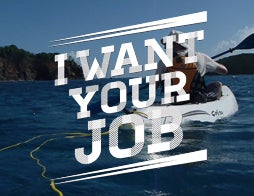Ransom White ’06 was looking for adventure and the opportunity to work on the ocean. At the College of Charleston, he found out he could combine both through a career in hydrographic surveying – while also traveling the world. He’s worked in dozens of countries, and married his geology department sweetheart, who is also a hydrographer.
Q: What do you do as a hydrographic surveyor?
A: I map the ocean floor using different types of sonars. I spend months at a time on a ship collecting data, then I make charts that show things like cable/pipeline routes, unexploded ordinances, shipwrecks, artifacts, etc. I’m an independent contractor and one of my favorite things is working with a multitude of companies and people in countries around the globe.
Q: What do you do in a typical day?
A: A typical day depends a good deal on the particular job. More often than not, the day will start offshore aboard a ship, of which there is a very colorful range! Typically, I work a 12-hour-on/12-hour-off schedule, so once I’ve been out to sea for a week, I have found a nice comfortable routine, which involves adjusting to meal and sleeping schedules, and having my daily work procedures well in place. There is always time for good conversations and a good joke here and there. It becomes a boat family and when I leave, I know those guys/gals pretty darn well.
There is a work season, typically summer through fall, in which I spend large chunks of time at sea, depending on the season. However once winter rolls around, my wife and I can travel for ourselves and prepare our lives for the next work season.
Q: What sparked your interest in this career?
A: I lived on a boat when I was growing up, so naturally, I was interested in the marine environment. I found my interest in geology at the College. Studying the expanses of time and forces that shaped our world and beyond appealed to me more than anything else. This combined with the desire for adventure lead me down this path.
Q: At what point were you “hooked”?
A: My professor and mentor Dr. Leslie Sautter (Doc) had begun organizing a program called Oceanica. Those were my first research cruises and I loved it. With Doc’s influence I took a promotional hydrographic software class at the College and met Graham Nickerson of Highland Geo who sent me to Sicily as an intern looking for Punic War artifacts. I quickly got hooked and from that moment on I concentrated on new clients and taking as much work as possible.
Obviously I would never have been here if I had not met the right people and been in the right places. I owe much of my career success to Doc’s Oceanica program.
A: Work has whisked me to and through (and in some cases many times over) the UK, Ireland, Cyprus, Israel, Malta, Arctic Canada, Dutch Harbor and the Aleutians, British Columbia, Puerto Rico, U.S. West Coast, US East Coast, Australia and Thailand. Sometimes jobs pop up out of nowhere and before you can process where you currently are, you are already heading to a place you have never been which becomes “home” for a month or so.
Q: Who can be successful in hydrographic surveying?
A: In order to work offshore you have to be able to get along with people. Spending long time periods in tight spaces means no one can afford to take or give much offense. Combine an “easy going” mentality with a good work ethic and you’re in like flynn… although it’s nice if you don’t get sea sick.






